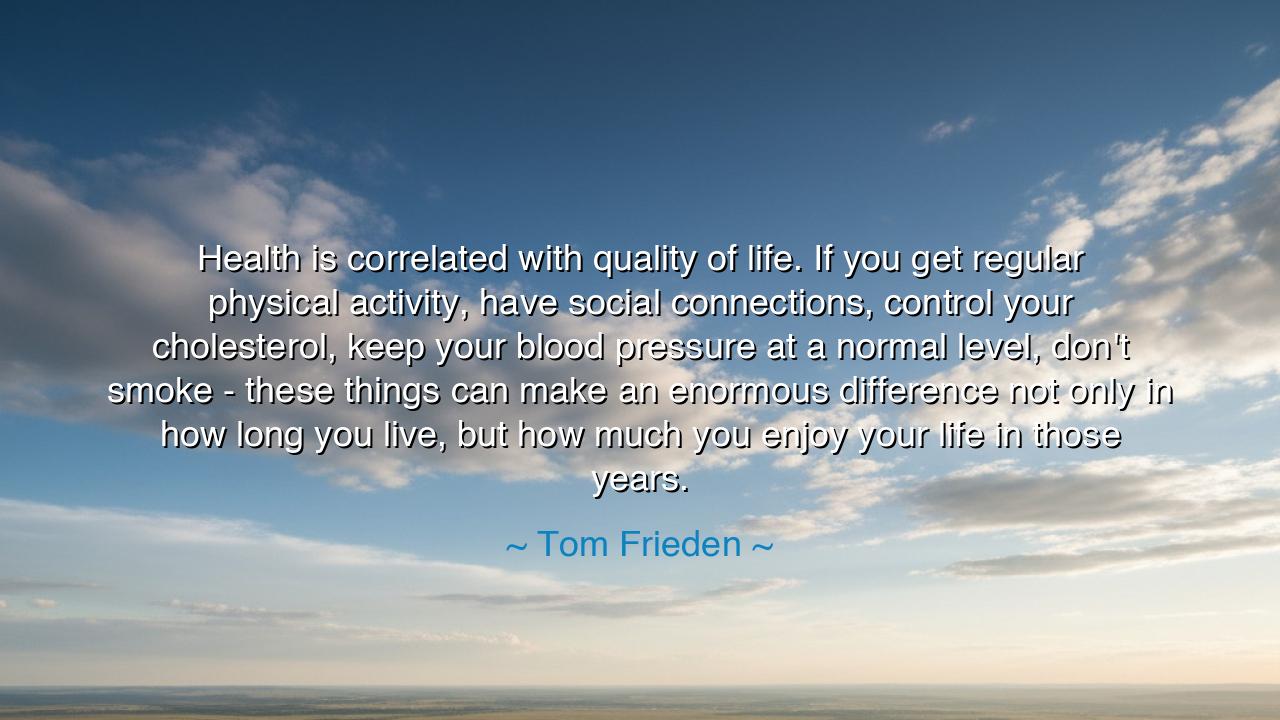
Health is correlated with quality of life. If you get regular
Health is correlated with quality of life. If you get regular physical activity, have social connections, control your cholesterol, keep your blood pressure at a normal level, don't smoke - these things can make an enormous difference not only in how long you live, but how much you enjoy your life in those years.






“Health is correlated with quality of life. If you get regular physical activity, have social connections, control your cholesterol, keep your blood pressure at a normal level, don’t smoke – these things can make an enormous difference not only in how long you live, but how much you enjoy your life in those years.” – Tom Frieden
In these wise and compassionate words, Tom Frieden, a physician and public health leader who once guided the Centers for Disease Control and Prevention, speaks as both healer and philosopher. His message is not merely medical—it is moral and eternal. He reminds us that health is not only a state of the body, but a condition of the soul, that the way we live each day determines not only the length of our journey, but the brightness of our path. His words call us back to the ancient truth that vitality is sacred—that our flesh, our breath, and our spirit are gifts meant to be honored, not squandered.
Frieden’s insight is born of a lifetime spent among the sick and the well, the weak and the strong. He has seen how the small choices of daily living—physical activity, friendship, balance, restraint—shape the destiny of a human life. When he speaks of keeping blood pressure normal, or avoiding smoking, he does not speak as a bureaucrat of health, but as one who knows the quiet heroism of discipline. Each good habit, however small, is an act of reverence for life itself, a vow to remain whole in a world that too often rewards indulgence and neglect.
The ancients, too, understood this sacred bond between body and spirit. The Greek physician Hippocrates, father of medicine, declared that “Walking is man’s best medicine.” The Stoics taught that mastery of the self begins with mastery of the flesh, that the mind cannot flourish in a temple that is decaying. Even the philosophers of the East spoke of balance—the harmony between movement and stillness, nourishment and abstinence, solitude and companionship. Frieden’s modern wisdom is but the echo of these ancient truths: that to care for the body is to honor the divine essence within it.
To see this truth made living, consider the story of Tao Porchon-Lynch, who began life in the early 20th century and lived more than a century in radiant health. She practiced yoga into her nineties, danced into her hundreds, and taught others how to breathe peace into their years. Her life was not merely long—it was luminous. Her strength came not from medicine or wealth, but from the daily rituals of movement, joy, and connection. Like Frieden’s teaching, her story proves that longevity without vitality is hollow, but vitality with wisdom can make every year golden.
When Frieden speaks of social connections, he touches upon something deeper than physical survival. The human heart, though sustained by blood, also hungers for companionship. Science itself now confirms what sages once whispered—that isolation weakens not only the mind, but the immune system; that love and friendship are as essential to health as air and water. Thus, to live well is not merely to exercise or to eat properly, but to belong, to share, to give and receive affection. The lonely may live long in years, but the connected live deeply in moments.
His warning against smoking and neglect is not condemnation, but compassion. For in every age, humanity has sought to numb its pain rather than heal it. Frieden calls us not to shame, but to awakening—to see that the habits which destroy us often begin as the comforts we refuse to release. The discipline he speaks of is not harshness, but love—the love of life strong enough to say, “I choose to remain alive in every sense of the word.”
The lesson, then, is clear and eternal: health is not a duty—it is a devotion. It is the art of honoring your own existence. Every choice—to move, to eat with mindfulness, to reach out to a friend, to let go of vice—is an offering to the temple of your body and the spirit within it. Let your days be filled with motion, laughter, and gratitude. Let your nights be peaceful, unburdened by regret. For the gift of health, once cherished, becomes the foundation of all joy.
So remember the words of Tom Frieden not as prescription, but as prophecy: Your life is the sum of your habits; your joy, the reflection of your care. Walk each morning as if the earth welcomes your steps. Breathe as though each breath is sacred. Nurture your friendships as though they are medicines of the heart. And in doing so, you will find not only more years in your life—but more life in your years.






AAdministratorAdministrator
Welcome, honored guests. Please leave a comment, we will respond soon